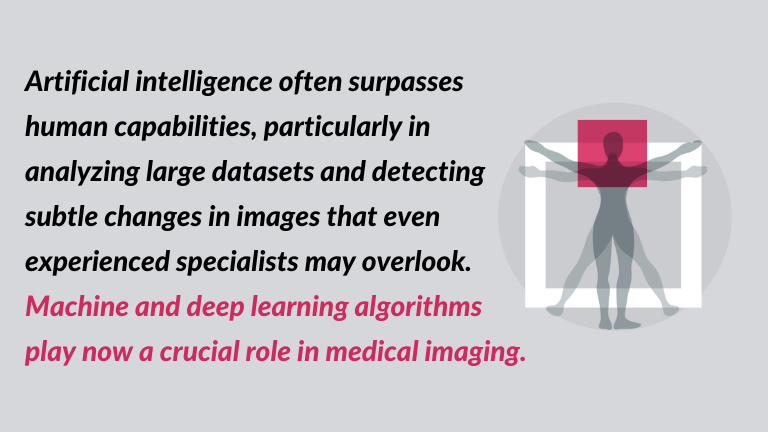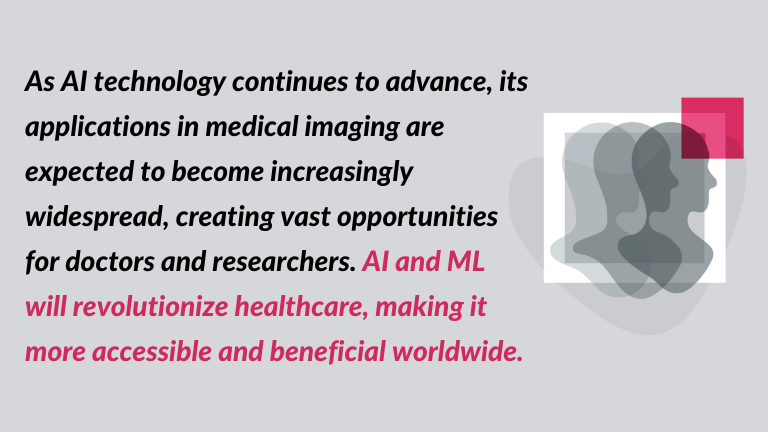AI for medical imaging analysis: the latest research on transforming diagnostics
Our blog features many articles focusing on imaging software development. We cover topics such as ethical issues, patient data security, the history of medical imaging, and the use of AI algorithms in various medical fields. In this post, we will delve into the latest research related to AI-based medical software development in radiology. We’ll explore whether recent scientific papers still consider algorithms and using ai for medical imaging analysis as the future of diagnostics.
Today, medical technology is advancing rapidly, and medical imaging is crucial for diagnosing and monitoring diseases. As medical technology evolves, medical imaging plays an increasingly vital role. At the same time, machine learning’s ability in data processing and analysis offers new opportunities for detecting and helping in the diagnosis of medical images. [1]
AI for medical imaging analysis in the age of advanced technology
Medical imaging techniques such as computed tomography (CT), magnetic resonance imaging (MRI), and ultrasound provide doctors with essential diagnostic insights. These techniques offer visual representations of the body’s internal organs, diseases, and abnormalities, serving as a crucial source of medical knowledge.
However, manually interpreting these images is a challenging and time-consuming task that demands a high level of medical expertise.

AI-assisted medical image detection technology offers a solution by automating the recognition and evaluation of medical images. This technology enables physicians to make more accurate and timely diagnoses.[2]
The use of artificial intelligence medical imaging
Artificial intelligence algorithms are increasingly being used in medicine to assist in disease diagnosis. These algorithms can analyze large amounts of imaging data and detect subtle changes that may be missed by the human eye. However, researchers consistently monitor and verify the effectiveness of these algorithms. Clinical testing and ongoing evaluation of AI’s performance are crucial to ensure that its use improves the diagnostic process while minimizing the risk of errors.
Recent research indicates that artificial intelligence, particularly deep learning, is revolutionizing medical image analysis. Machine learning algorithms enable computers to analyze images, identify abnormalities, and assist in diagnostics with exceptional efficiency and precision.
Capabilities of artificial intelligence
Artificial Intelligence often surpasses human capabilities, particularly in analyzing large datasets. It can also detect subtle image changes that even experienced specialists may overlook. Machine and deep learning algorithms play now a crucial role in medical imaging by performing the following functions:
1. Detecting complex patterns. These algorithms are capable of identifying intricate patterns in medical images, which is essential for diagnosing complex diseases such as cancer and neurological disorders.
2. Reducing human error. AI’s high-speed processing and ability to minimize human error accelerate diagnostics and improve operational efficiency and cost-effectiveness by reducing unnecessary scans and misdiagnoses.
3. Enabling predictive and personalized healthcare. By utilizing historical and patient-specific data, AI aids in early disease detection and the creation of tailored treatment plans. This leads to better patient outcomes.
4. Supporting clinical decision-making. AI assists in complex procedures and integrates with existing technologies, providing comprehensive health insights to enhance clinical decision-making. [3]
Future potential
As AI technology continues to advance, its applications in medical imaging are expected to become increasingly widespread. This will create vast opportunities for doctors and researchers.
AI and ML can be applied to various areas of healthcare, including medical diagnosis and treatment, pharmaceutical manufacturing, computerized numerical control, healthcare administration and economics through centralized monitoring systems and geofencing, medical education and training, and big medical data management and analysis. [4]

AI for medical imaging analysis: solidifying its role
The development of medical imaging software, with a focus on the use of artificial intelligence and machine learning, brings enormous benefits to medicine.
What is important is that healthcare professionals should be well-informed about AI and its potential to improve patient care.[5]
Innovative solutions give doctors tools that can enhance the quality of diagnostics and patient care. As recent studies cited in the text indicate, the future of medical imaging is filled with exciting opportunities that have the potential to revolutionize our approach to health and medical care.
Resources:
[1], [2] Qiang Zeng, Wenjian Sun, Jingyu Xu, Weixiang Wan, Linying Pan: Machine Learning-Based Medical Imaging Detection and Diagnostic Assistance, March 2024, https://www.researchgate.net/publication/379538552_Machine_Learning-Based_Medical_Imaging_Detection_and_Diagnostic_Assistance
[3] Mohamed Khalifa, Mona Albadawy: AI in diagnostic imaging: Revolutionising accuracy and efficiency, 2024, https://www.sciencedirect.com/science/article/pii/S2666990024000132
[4], [5] Dr. Naresh Purohit, Dr. Varsha Narayanan, Harnessing the Potential of Artificial Intelligence and Machine Learning Technologies in Building the Future of Healthcare Services, February 2024, https://www.researchgate.net/publication/379084819_Harnessing_the_Potential_of_Artificial_Intelligence_and_Machine_Learning_Technologies_in_Building_the_Future_of_Healthcare_Services